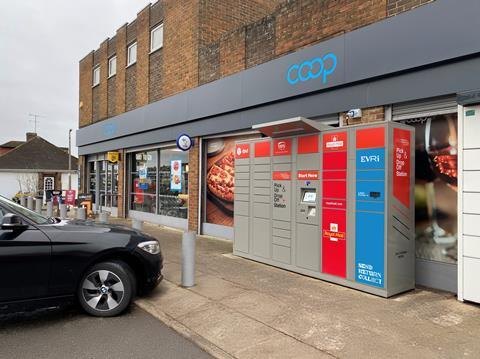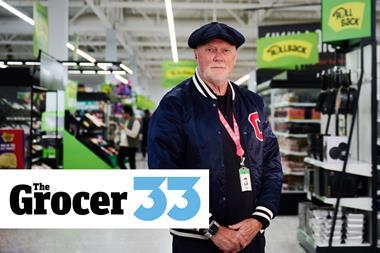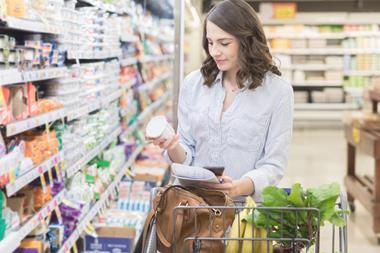Repositioning supermarkets as multi-service hubs creates convenience, boosts footfall and incremental spend. With tighter household budgets, added services like parcel lockers can offer a compelling reason to visit and spark impulse buys that might otherwise be missed.
From lotteries to launderettes, and cafés to cobblers, UK supermarkets have tried-and-tested myriad ways to turn bricks-and-mortar stores into more multi-purpose destinations over the last decade.
By combining their core food and drink offer with these complementary services, they’ve been able to tempt more people through the doors, increase dwell time and nudge shoppers into topping up baskets with extra purchases they may not otherwise have picked up.
And in today’s tough economic climate, with volumes dampened by ongoing inflation and squeezed household budgets limiting those little extras, it’s a strategy that’s more important than ever, with senior leaders carefully re-examining every inch of underutilised space in stores.
As they do, lockers have become a central part of that multi-purpose proposition, providing instant additional revenue, as well as a popular and cost-effective addition to their ever-growing list of ancillary services.
In fact, in the last few months alone, Sainsbury’s, Co-op and Aldi have all announced partnerships to offer lockers at their locations. Hundreds of new units are set to be installed across stores in a bid to tap into the millions of online parcels now being sent and collected each week in the UK, with social commerce transactions, via platforms like Vinted, alone driving significant additional usage in recent years.
So, how exactly are supermarkets leaning into lockers? What benefits are they seeing already? And how can lockers go even further in helping them meet their aspirations as a multi-purpose destination?
Multifaceted benefits
The evolution of supermarkets into multi-service destinations has been happening for a few years, points out Lee Graham, sales director for Europe (Lockers) at Quadient. It was fuelled at first by the decline in high streets and the erosion of local services, be it cobblers, post offices or pharmacies. “People still needed these services and so retailers have added them to their own portfolios to replace the gaps in high streets and turn their stores into more of a destination.”
Driving this approach more recently have been the inevitable shifts in consumer spending that accompany an inflationary climate. Four in five (78%) UK shoppers say they’ve cut down on what they spend in supermarkets, according to a 2025 poll by Maru, opting for budget alternatives over brands in a bid to cut costs, and feeling less inclined toward unplanned purchases.
For many supermarkets that has reignited a focus on how to utilise white space to get people to stay more – and spend more – in stores, as well as maximise their real estate.
And against that backdrop, adding a locker is a relatively low-maintenance, cost-effective addition, believes Graham. It replaces long queues building up at parcel counters with an automated alternative that requires zero input from busy staff.
“Staffing costs in retail and hospitality have risen significantly in recent years, so retailers are looking for ways to deliver more services without increasing the pressure on their teams,” says Graham. “If staff members are tied up handling parcels at a counter, that’s time they can’t spend supporting customers elsewhere in the store. Lockers offer a light-touch way to bring customers through the door while freeing up store teams’ time to focus on higher-value tasks.
And their impact can be significant. For one leading retailer that has partnered with Quadient, 76% of people reported heading to one of their stores specifically to use a locker, and 29% then went inside to use their services. These kind of results might go some way to explaining why Aldi UK has seemingly backed parcel lockers, while discontinuing other ancillary services, such as click-and-collect, at its own stores. After a successful trial, the discount retailer announced it would roll out lockers to more stores in January citing high levels of positive feedback from its consumers on the convenience of the service.
The Co-op has also expanded its parcel collection offer with lockers. “As a convenience retailer with a store in every postal area, we are focused on rolling out parcel collection services in locations that are as convenient as possible for our customers.” says Kirsti Thompson, its senior manager for online collection and returns.
“It is about consumer choice. Co-op offers over counter parcel services in hundreds of stores and has done so for many years. It is a very popular service with customers – it meets the needs of local communities, so many people like the human interaction in a physical store, it is important to them and, it also suits our diverse store estate. We have also grown our locker network in partnership with different providers, including Quadient. We are approaching 1,000 Lockers located at Co-op stores in towns, villages and cities UK-wide.”
On top of that, the retailer has typically introduced lockers where space is previously unused, either inside or outside a store.
“The lockers can be available 24/7 – providing the service when and where our customers need it. Plus, there is also the footfall element to parcel services,” adds Thompson. “Our aim is to create stores which are a destination, a community hub. Consumers are sending more and more parcels, so it’s important that we provide a range of options for consumers to collect or return parcels safely, securely and at a time and place that is convenient for them.”

Opening the door to further opportunity
While supermarkets are starting to embrace the benefits of lockers, there’s still so much more they could do to unlock their value, believes Graham.
Quadient offers greater flexibility with its locker network, including a shared locker format that allows grocers to reserve a proportion of each unit for their own use. This means retailers are not limited to handling third-party parcels – they can also use lockers for their own online orders, giving customers a simple way to pick up items bought directly from the retailer. The lockers can also support additional services beyond just parcels, such as key exchange or luggage storage, further extending their value as a multi-purpose solution.
“There is so much potential for grocers to think creatively about how lockers can extend their service offering”, says Graham. “It’s not just about parcels – it’s about creating convenient touchpoints that bring people through the doors and encourage them to shop”.
And that, ultimately, is what it all comes down to.
Be it pharmacies, key cutters or lockers, populating stores with complementary services that reflect modern daily life gives shoppers more reason to head to stores, tick off their to-do list with as little fuss as possible and – hopefully – pick up their groceries while they’re there.
If you’d like to find out more information or are interested in hosting a Parcel Pending by Quadient locker, click here.





















